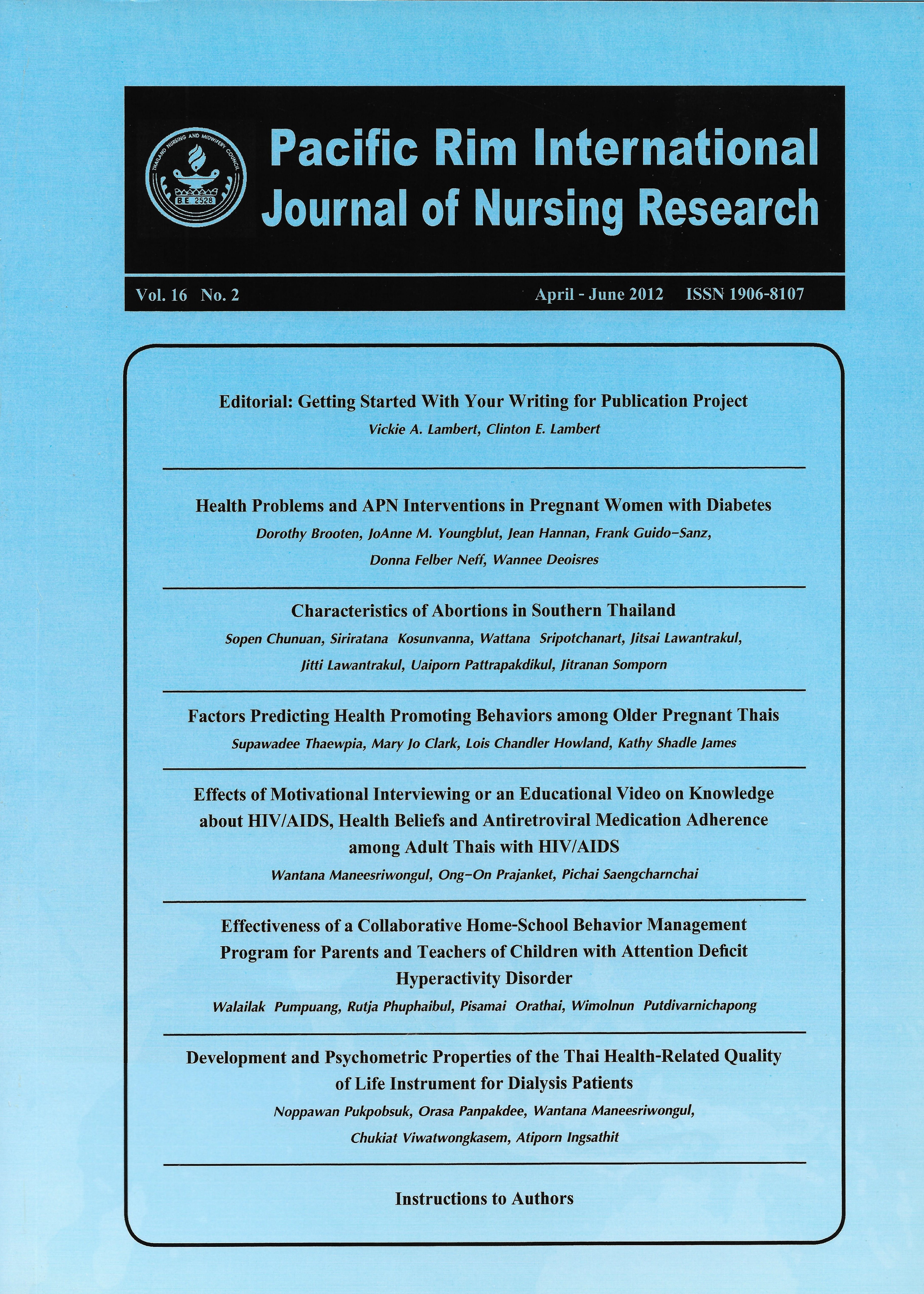Development and Psychometric Properties of the Thai Health-Related Quality of Life Instrument for Dialysis Patients
Keywords:
คุณภาพชีวิตด้านสุขภาพ, การพัฒนาเครื่องมือวัด, คุณสมบัติการวัดทางจิตวิทยา, ผู้ป่วย dialysis, Health-related quality of life, Instrument development, Psychometricproperties, Dialysis patientsAbstract
บทคัดย่อ
การศึกษานี้มีวัตถุประสงค์เพื่อพัฒนาและทดสอบคุณสมบัติการวัดทางจิตวิทยาของเครื่องมือประเมินคุณภาพชีวิตด้านสุขภาพในผู้ป่วย dialysis (THAI-HRQOL-D)โดยความหมายและองค์ประกอบของคุณภาพชีวิตด้านสุขภาพในการศึกษาครั้งนี้ได้พัฒนามาจาก การวิเคราะห์เนื้อหาจากการสัมภาษณ์เชิงโครงสร้างและการทบทวนวรรณกรรมที่เกี่ยวข้อง โดยมีกรอบทฤษฎีในการศึกษาคือกรอบแนวคิดคุณภาพชีวิตของ Ferrans เครื่องมือนี้ผ่านการตรวจสอบความตรงเชิงเนื้อหาจากผู้เชี่ยวชาญจำนวน 7 คน ทดสอบความยากง่ายและความเข้าใจข้อคำถามในผู้ป่วย dialysis จำนวน 10 คน และทดสอบคุณสมบัติการวัดเบื้องต้น และความเหมาะสมของข้อคำถามในผู้ป่วย dialysis จำนวน 40 คน
ทดสอบคุณสมบัติของเครื่องมือในผู้ป่วย dialysis จำนวน 420 คน ที่ได้รับบริการบำบัดทดแทนไตในเขตกรุงเทพมหานครจำนวนสองศูนย์ รวมทั้งหน่วยไตเทียมมูลนิธิโรคไตแห่งประเทศไทย ณโรงพยาบาลสงฆ์ และอีกหนึ่งศูนย์บริการบำบัดทดแทนไตในจังหวัดสมุทรสาคร โดยทดสอบความตรงเชิงโครงสร้างด้วยการวิเคราะห์องค์ประกอบเชิงสำรวจ และการวิเคราะห์องค์ประกอบเชิงยืนยัน
ผลการวิเคราะห์พบว่าแบบประเมินคุณภาพชีวิตด้านสุขภาพประกอบด้วย 7 องค์ประกอบ 37ข้อคำถาม ซึ่งสามารถอธิบายความแปรปรวนได้ทั้งหมด 54.86% ประกอบด้วย 1) สุขภาพและการทำหน้าที่ของร่างกาย 2) ความผาสุกทางจิตใจ 3) เศรษฐกิจ-สังคม และครอบครัว 4) การดำรงชีวิตอยู่กับการฟอกไต 5) จิตวิญญาณ 6) การดำรงชีวิตอยู่กับอาการแสดง และ 7) การรู้คิด โมเดลการประเมินคุณภาพชีวิตด้านสุขภาพมีความสอดคล้องกับข้อมูลเชิงประจักษ์อยู่ในเกณฑ์ดี (χ2=892.53, df = 603(p<.001), χ2/df =1.48, RMSEA=.048, GFI =.820, CFI=.904) เครื่องมือนี้มีค่าความเที่ยงชนิดสอดคล้องภายใน (Cronbach’s alpha coefficients) ของแต่ละองค์ประกอบ .557 ถึง .889 และของเครื่องมือทั้งฉบับ .842 นอกจากนี้ยังมีคุณสมบัติของความตรงเชิงเหมือน โดยสัมประสิทธ์สหสัมพันธ์ระหว่าง คุณภาพชีวิตด้านสุขภาพของ THAI-HRQOL-D และ Thai Health Status Assessment Instrumentเท่ากับ .63 และมีคุณสมบัติความตรงเชิงสัมพันธ์กับเกณฑ์ ระหว่าง คุณภาพชีวิตด้านสุขภาพของ THAIHRQOL-D กับเกณฑ์ประเมิน 2 เกณฑ์คือ ระดับอัลบูมินในเลือด และประวัติการเข้ารับการรักษาในโรงพยาบาลของผู้ป่วย dialysis ดังนั้นเครื่องมือที่พัฒนาใหม่นี้มีความตรงและความเที่ยงในการประเมินคุณภาพชีวิตด้านสุขภาพในผู้ป่วยไทยที่ได้รับการรักษาด้วยวิธี dialysis
คำสำคัญ: คุณภาพชีวิตด้านสุขภาพ; การพัฒนาเครื่องมือวัด; คุณสมบัติการวัดทางจิตวิทยา; ผู้ป่วย dialysis
Abstract
This study sought to develop and assess the psychometric properties of the ThaiHealth-Related Quality of Life Instrument for Dialysis Patients (THAI-HRQOL-D). The conceptualdefinition and content domains of the instrument were developed through semi-structuredinterviews and a comprehensive literature review. Ferrans’ Quality of Life conceptual frameworkwas used to guide the research. Face validity of the instrument was determined via ten dialysispatients. Content validity was assessed via a panel of seven experts, and the initial psychometricproperties and identification of inappropriate items were determined by 40 dialysis patients.
Data for final psychometric assessment of the instrument were collected from 420 Thaidialysis patients, who attended one of three dialysis centers in Bangkok or a dialysis center inSamutsakorn province, Thailand. The construct validity of the tool was determined throughexploratory and confirmatory factor analysis.
The results revealed seven factors explained 54.86% of the variance. These factors, consistingof 37 items, including: health and functioning; psychological well-being; socioeconomics andfamily; living with dialysis; spirituality; living with symptoms; and, cognition. The measurementmodel was found to have a relatively goodness of fit with the data (χ2=892.53; df = 603 (p<.001);χ2/df =1.48; RMSEA= 0.048; GFI = 0.820; and, CFI= 0.904). Cronbach’s alpha coefficients foreach of the subscales ranged from 0.557 to 0.889 and the total scale’s Cronbach’s alpha was0.842. In addition, a 0.63 correlation was found between the THAI-HRQOL-D and the ThaiHealth Status Assessment Instrument providing evidence of the instrument’s convergent validity.Concurrent validity was found between the THAI-HRQOL-D and two concurrent measures(serum albumin levels and hospitalizations of dialysis patients). Thus, it was determined thenewly developed instrument demonstrated adequate reliability and validity for assessing health-relatedquality of life among Thai dialysis patients.
Keywords: Health-related quality of life; Instrument development; Psychometricproperties; Dialysis patients
Downloads
How to Cite
Issue
Section
License
Copyright: The Pacific Rim International Journal of Nursing Research, Thailand Nursing & Midwifery Council has exclusive rights to publish, reproduce and distribute the manuscript and all contents therein.








.png)



